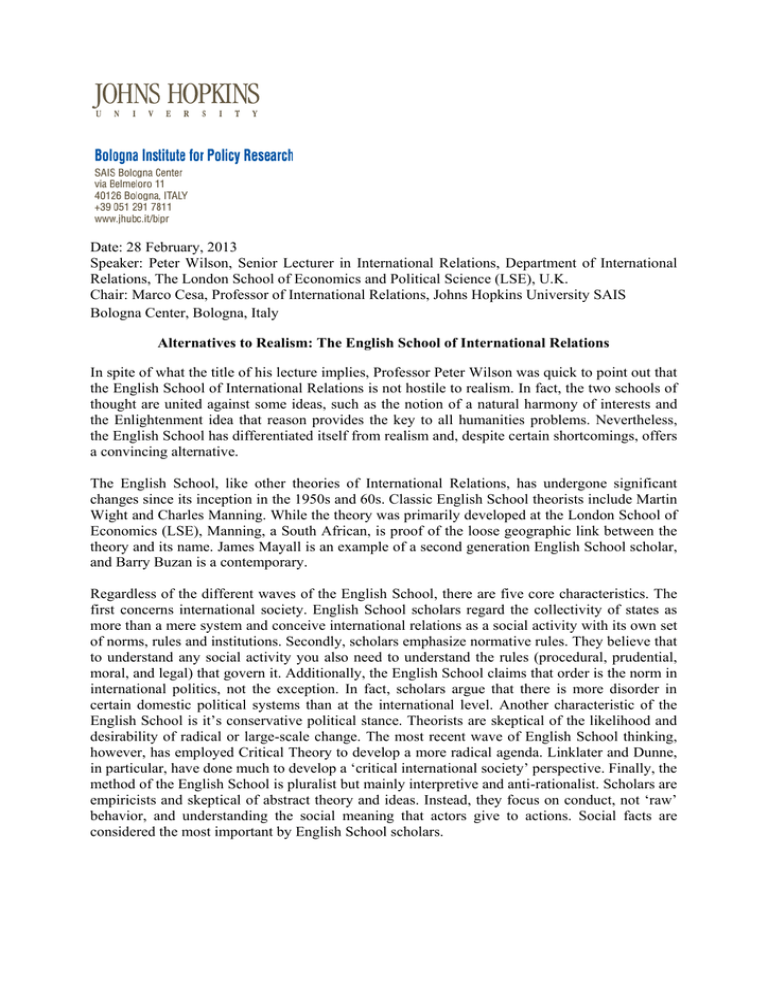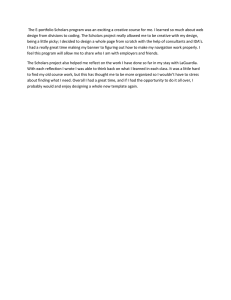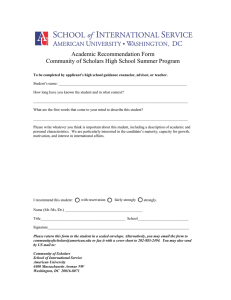Date: 28 February, 2013 Speaker: Peter Wilson, Senior Lecturer in
advertisement

Date: 28 February, 2013 Speaker: Peter Wilson, Senior Lecturer in International Relations, Department of International Relations, The London School of Economics and Political Science (LSE), U.K. Chair: Marco Cesa, Professor of International Relations, Johns Hopkins University SAIS Bologna Center, Bologna, Italy Alternatives to Realism: The English School of International Relations In spite of what the title of his lecture implies, Professor Peter Wilson was quick to point out that the English School of International Relations is not hostile to realism. In fact, the two schools of thought are united against some ideas, such as the notion of a natural harmony of interests and the Enlightenment idea that reason provides the key to all humanities problems. Nevertheless, the English School has differentiated itself from realism and, despite certain shortcomings, offers a convincing alternative. The English School, like other theories of International Relations, has undergone significant changes since its inception in the 1950s and 60s. Classic English School theorists include Martin Wight and Charles Manning. While the theory was primarily developed at the London School of Economics (LSE), Manning, a South African, is proof of the loose geographic link between the theory and its name. James Mayall is an example of a second generation English School scholar, and Barry Buzan is a contemporary. Regardless of the different waves of the English School, there are five core characteristics. The first concerns international society. English School scholars regard the collectivity of states as more than a mere system and conceive international relations as a social activity with its own set of norms, rules and institutions. Secondly, scholars emphasize normative rules. They believe that to understand any social activity you also need to understand the rules (procedural, prudential, moral, and legal) that govern it. Additionally, the English School claims that order is the norm in international politics, not the exception. In fact, scholars argue that there is more disorder in certain domestic political systems than at the international level. Another characteristic of the English School is it’s conservative political stance. Theorists are skeptical of the likelihood and desirability of radical or large-scale change. The most recent wave of English School thinking, however, has employed Critical Theory to develop a more radical agenda. Linklater and Dunne, in particular, have done much to develop a ‘critical international society’ perspective. Finally, the method of the English School is pluralist but mainly interpretive and anti-rationalist. Scholars are empiricists and skeptical of abstract theory and ideas. Instead, they focus on conduct, not ‘raw’ behavior, and understanding the social meaning that actors give to actions. Social facts are considered the most important by English School scholars. The problem the English School seeks to solve is the ‘order puzzle’. As noted earlier, a fundamental belief of the school is that order exists at the international level. The question is where it comes from. While order is maintained at the domestic level by the ‘leviathan’, or government, no such entity exists at the international level. English School theorists answer that institutions are responsible for order. Primary or fundamental institutions are basic to social order. Examples within the state included the family and the civil service. According to the English School, society is held together at both the domestic and international level by a mixture of coercion, calculation and belief. The most secure and stable societies are those held together mainly by belief. This is where institutions in the primary or fundamental sense come in. Institutions ensure that rules and norms are complied with, not as a result of calculation or coercion, but rather as a result of belief in their legitimacy. While English School scholars present a united front in their presentation of institutions as the solution to the ‘order puzzle’, scholars struggle to present a common definition of what makes an institution. This lack of definition has resulted in great variance amongst scholars of what exactly the institutions of international society are. Wilson cited diplomacy, balance of power and sovereignty as examples, but noted that diplomacy is the only one that all scholars agree on. The English School of International Relations is essentially a middle path between British liberal institutionalism and American realism. However, the English School does make some significant departures from the more popular theories. For example, according to the English School, sovereignty is not conceived as a fact, but rather an idea. The balance of power is not an automatic mechanism, but rather contrived. Alliances are based on more than interests, but also, quite often, a sense of shared destiny. War is not endemic to the system. Hegemony requires willing followers. Social obligations and expectations play a role in dictating the actions and interests of states. Hedley Bull, in particular, stressed the importance of consciousness of the rules, norms and institutions of international society. Additionally, the English School believes prediction is impossible except in a very broad sense that compliance with the major rules of the game, international law, is high. Such high compliance results in patterns of behavior that reduces the unpredictability of an otherwise highly uncertain realm. In conclusion, the English School of International Relations does not have all the answers. It suffers from certain empirical weaknesses. The relation between some of its key concepts such as international society and world society remains underexplored. However, its advantages are numerous. Through its use of cultural context, dialogue and practical language, the English School provides a deeper, richer, truer and more open account of International Relations than the major alternatives. 2


